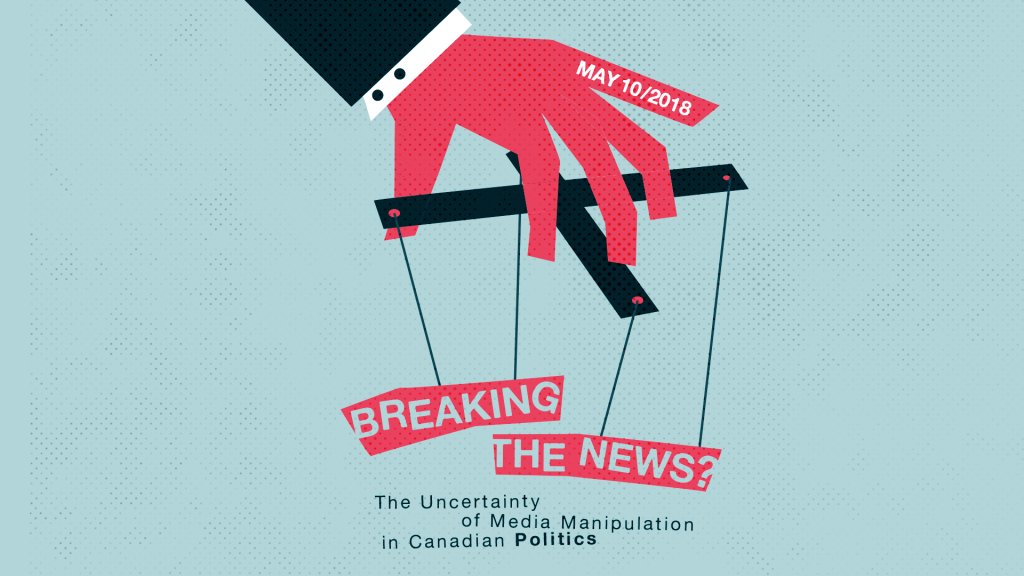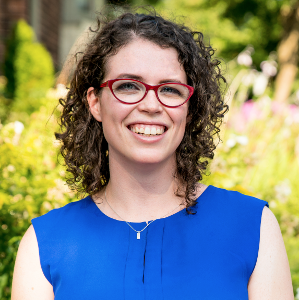When: May 10, 2018
6:30: Doors open
7:00 – 9:00pm: Public Forum
Location: Sir G Williams University Alumni Auditorium, Henry F. Hall Building, Concordia University (1455 Boulevard de Maisonneuve O, Montreal)
Host: Fenwick McKelvey, Concordia University, CSDC
Registration is now open for the CSDC’s Public Forum ‘Breaking the News?’
IMPORTANT INFORMATION
Registration – The event is free and open to the public, however, places in the conference room are limited and registration is therefore required. You can register here.
Twitter – You can live-tweet using @CSDC_CECD
The main language of the public forum will be English, but simultaneous translation will be provided in French.

THE FORUM
The Centre for the Study of Democratic Citizenship will be hosting a public forum on the ‘ambivalence’ of tactical media in politics. The forum will take place on May 10, 2018 and will start at 7pm at the Sir G Williams University Alumni Auditorium in the Henry F. Hall Building of Concordia University (1455 Boulevard de Maisonneuve O, Montreal).
Who breaks the news? And how? What appears in our news feeds comes from constant campaigning by activists, politicians and partisans pushing their own agendas and excluding others. From the Yes Men’s pranks to the latest conspiracy video trending on YouTube, these interventions allow partisans to make an outsized impact on public discourse. With the growing influence of social media and the changing news industry, this roundtable addresses the changing tactics of media activism.
But has the news always been broken? The panel also seeks to contextualize today’s debates in the longer history of media activism. Indigenous and critical histories of the media in Canada have long identified the shortcomings and silences in its coverage. This rountables introduces audiences to ways activists have interrupted the regular program to include voices marginalized by mainstream media.
Media activism has always been part of politics, but today there is greater uncertainty about its impact on democracy. As provincial and federal elections near, tactical media’s uncertain consequences for democracy in Quebec and Canada is a matter of urgent public concern. In this roundtable, our participants will survey the tricky terrain of media manipulation. Where is the line between media activism and political sabotage? And, in a world made meme, what’s the difference between pranks, propaganda and progress?
THE PANELISTS
 |
Elizabeth Dubois (@lizdubois), PhD writes, speaks, and teaches at the intersection of technology and politics. Technology critic meets advocate meets academic, she is an Assistant Professor at the University of Ottawa. Her work examines digital media, influence and political engagement. Elizabeth is a graduate of the Oxford Internet Institute at the University of Oxford where she completed a DPhil (PhD) in Information, Communication and the Social Sciences as well as an MSc in the Social Sciences of the Internet (distinction). As a Public Policy Forum Fellow Elizabeth is investigating public policy options around the future of news. She is also on the Advisory Board for Ottawa Civic Tech and an Academic Advisor for Samara. |
 |
Rebecca Lewis (@beccalew) is a Researcher at Data & Society Research Institute, where she focuses on media manipulation, disinformation, and online extremism. She holds an MSc in Social Science from the Oxford Internet Institute, where she researched the role of information technologies in media and politics. She also worked with the Reuters Institute for the Study of Journalism, where she contributed to research analyzing the rise of digital news intermediaries. She previously worked in social media analytics and received her BA in Film Studies from Columbia University. |
 |
Ryan Scrivens (@R_Scrivens) studies right-wing extremism, terrorism and extremism online. He is a Horizon Postdoctoral Fellow at Concordia University, Canada, working with Project SOMEONE to build resilience against hatred and radicalization leading to violent extremism, both on- and offline. Dr. Scrivens has presented before the Royal Canadian Mounted Police and the Canadian Security Intelligence Service. His work has also been featured in BBC News, The New York Times, and CBC News. |
 |
Fenwick McKelvey (@mckelveyf), is an Assistant Professor in Information and Communication Technology Policy in the Department of Communication Studies at Concordia University. Amidst discussion of the Internet of Things, Fenwick McKelvey studies the Internet as Things. Investigating the machines, bots, artificial intelligence, algorithms, and daemons that make up the Internet’s infrastructure, his research takes him from debates at the CRTC to data centres and from Gilles Deleuze to John Dewey. |
MODERATOR
 |
Jane Lytvynenko (@JaneLytv) is a reporter for BuzzFeed News. |
The public forum is supported and funded by the Social Sciences and Humanities Research Council of Canada, the Algorithmic Media Observatory, Concordia University, and the Centre for the Study of Democratic Citizenship
 |
 |
 |
 |
